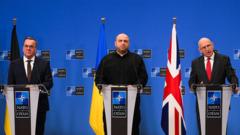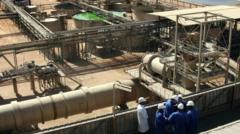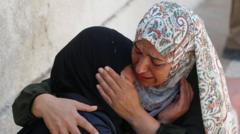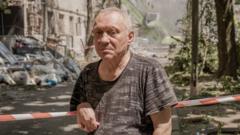In a significant commitment to bolster Ukraine's defenses, European allies have pledged a substantial €21 billion (£18.2 billion) in military aid during a meeting of the Ukraine Defence Contact Group (UDCG) at NATO's headquarters in Brussels. This latest tranche of support underscores the urgency expressed by defense officials as the conflict in Ukraine approaches what they deem a "critical year."
Ukrainian Allies Commit €21 Billion in Military Support Amid Ongoing Conflict

Ukrainian Allies Commit €21 Billion in Military Support Amid Ongoing Conflict
European defense leaders gather in Brussels to reinforce military assistance to Ukraine as the war enters a critical phase.
German Defense Secretary Boris Pistorius announced that Berlin would contribute €11 billion over the next four years, while UK Defense Secretary John Healey highlighted the importance of sending a decisive message to Moscow amid the ongoing aggression. The assembled ministers categorized air defenses and missile systems as priority areas for assistance.
This aid package includes a £450 million contribution from the UK and Norway to enhance Ukraine's military capabilities through vital resources such as radar systems, anti-tank mines, and drones. Healey pointed to the staggering impact of drone warfare in recent combat, emphasizing that drones are responsible for a significant majority of battlefield casualties.
Gathering were defense ministers from 50 nations, with U.S. Defense Secretary Pete Hegseth participating remotely to express appreciation for allies' efforts. Minister Pistorius clarified that Hegseth's remote attendance stemmed from scheduling issues, underscoring the importance of U.S. support amidst shifting military priorities.
Ukrainian President Volodymyr Zelensky joined the discussions remotely, expressing gratitude to Europe for assuming leadership in security aid, while also acknowledging continuing U.S. involvement. The ministers condemned Russia's lack of progress towards peace, noting the extended timeframe since a U.S.-backed peace proposal was rejected by Moscow.
As the discussions continued in Brussels, tensions remain high, particularly with reports of Russian territorial advancements. Ukraine's defense ministry has yet to confirm claims of Russian success in capturing the village of Zhuravka near the Sumy region. As the conflict persists, both sides brace for an intensified struggle in the months to come.
This aid package includes a £450 million contribution from the UK and Norway to enhance Ukraine's military capabilities through vital resources such as radar systems, anti-tank mines, and drones. Healey pointed to the staggering impact of drone warfare in recent combat, emphasizing that drones are responsible for a significant majority of battlefield casualties.
Gathering were defense ministers from 50 nations, with U.S. Defense Secretary Pete Hegseth participating remotely to express appreciation for allies' efforts. Minister Pistorius clarified that Hegseth's remote attendance stemmed from scheduling issues, underscoring the importance of U.S. support amidst shifting military priorities.
Ukrainian President Volodymyr Zelensky joined the discussions remotely, expressing gratitude to Europe for assuming leadership in security aid, while also acknowledging continuing U.S. involvement. The ministers condemned Russia's lack of progress towards peace, noting the extended timeframe since a U.S.-backed peace proposal was rejected by Moscow.
As the discussions continued in Brussels, tensions remain high, particularly with reports of Russian territorial advancements. Ukraine's defense ministry has yet to confirm claims of Russian success in capturing the village of Zhuravka near the Sumy region. As the conflict persists, both sides brace for an intensified struggle in the months to come.






















